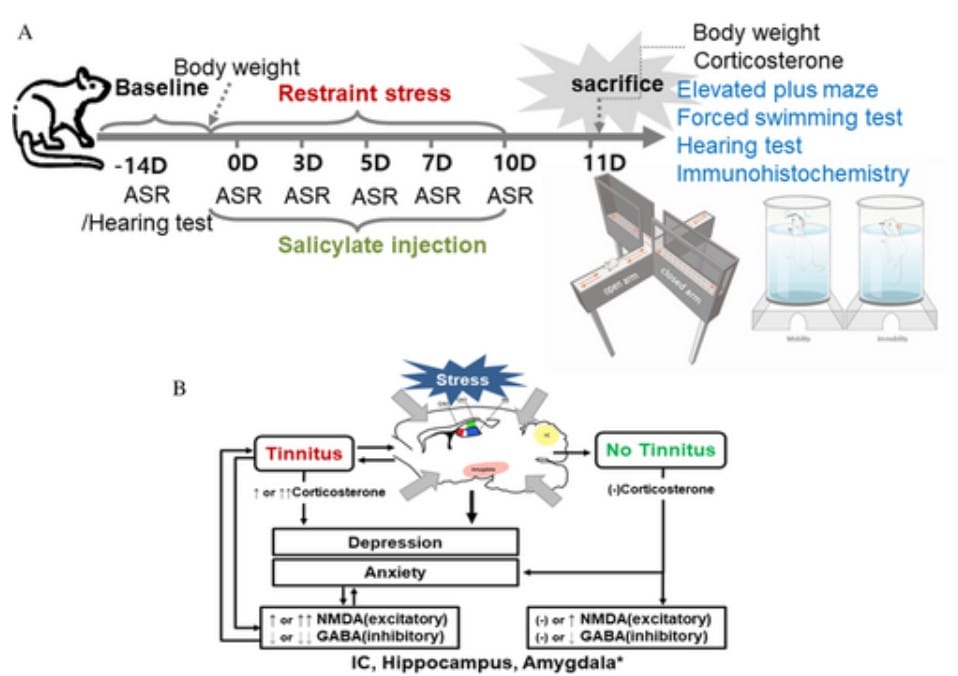Chronic stress, a common feature of modern life, is now being recognized as a potential trigger for a range of health issues, including tinnitus. Tinnitus, the perception of sound without an external source, affects millions of people worldwide and is typically associated with hearing loss. However, emerging research suggests that stress, particularly chronic stress, may play a significant role in its development. A recent study, Tinnitus Generation and Behavioral Changes Caused by Chronic Stress: A Behavioral and Brain Study in a Rat Model, published in The Laryngoscope, delves into this connection. The study offers new insights into the relationship between chronic stress, tinnitus onset, and behavioral changes such as anxiety and depression, helping to clarify the neural mechanisms involved.
Prior research has shown that stress can exacerbate or, in some cases, directly cause tinnitus. Stress affects the auditory system by altering neurotransmitter levels and neural activity, potentially leading to tinnitus. However, the exact mechanisms have not been fully explored. This study, led by Ye Lin Kim and colleagues from the Catholic University of Korea, aimed to investigate how chronic stress alone might contribute to the development of tinnitus and associated behavioral changes.
The researchers used a rat model to observe the effects of chronic stress in a controlled setting, enabling them to closely examine both neural and behavioral changes. This approach provided valuable insights into how stress might trigger tinnitus and alter brain function in ways that mirror human experiences, offering a clearer understanding of the condition’s development.

Graphical abstract. (A) Experimental design. (B) A Possible Mechanism of chronic stress -induced tinnitus ASR = acoustic startle reflex. Image credit: Kim et. al
Research Methods
The researchers used 44 male Sprague-Dawley rats, dividing them into four distinct groups: a control group (CG), a sodium salicylate-induced tinnitus group (STG), and two groups exposed to chronic restraint stress—one that developed tinnitus (RTG) and one that did not (RNTG). The rats in the experimental groups were subjected to two hours of daily restraint stress for ten consecutive days, a method designed to simulate chronic stress exposure.
Tinnitus was assessed using the gap response of pre-pulse inhibition acoustic reflex (GPIAS), a method that measures the rats’ response to gaps in sound, which has been established as an effective measure of tinnitus in animal models. In addition to tinnitus assessments, the researchers conducted auditory brainstem response (ABR) and distortion product otoacoustic emission (DPOAE) tests to evaluate hearing function.
Behavioral assessments were also performed to evaluate the levels of anxiety and depression in the rats. These included the elevated plus maze (EPM) test for anxiety and the forced swimming test (FST) for depressive behavior. Additionally, plasma corticosterone levels, an indicator of stress, were measured to confirm the impact of chronic stress.
Finally, the researchers conducted immunohistochemical analyses to examine changes in neurotransmitter receptor expression in key brain areas associated with auditory processing and emotional regulation, including the inferior colliculus (IC), hippocampus, and amygdala.
Key Findings
The results of the study showed a clear link between chronic stress and the development of tinnitus. Approximately 64.3% of the rats exposed to chronic stress developed tinnitus, despite no significant changes in their auditory thresholds. This suggests that tinnitus may not always be associated with direct damage to the auditory system but can result from altered neural activity due to stress.
In terms of behavioral outcomes, the rats that developed tinnitus (RTG) exhibited significantly higher levels of anxiety and depression compared to both the control group and the non-tinnitus stress group (RNTG). These findings align with previous research suggesting that tinnitus is often accompanied by heightened emotional distress.
The immunohistochemical analyses revealed specific changes in neurotransmitter receptor expression in the brains of the tinnitus-affected rats. Notably, there was a decrease in γ-aminobutyric acid (GABA) receptor expression and an increase in N-methyl-D-aspartate (NMDA) receptor expression in regions such as the hippocampus and inferior colliculus. These changes suggest that chronic stress may disrupt the balance between inhibitory and excitatory neurotransmission, contributing to the development of tinnitus.
Implications
The findings of this study have significant implications for our understanding of tinnitus and its relationship to stress. The research suggests that chronic stress alone can be a causal factor for tinnitus, even without hearing loss or auditory damage, challenging the traditional view of tinnitus as primarily an auditory issue. This highlights the need to consider both psychological and neural factors in its development, emphasizing that tinnitus may be more complex than previously thought.
The study provides valuable insights into the neural mechanisms behind tinnitus. Changes in neurotransmitter receptor expression, as observed in the research, indicate a reorganization of neural circuits due to chronic stress. This reorganization may explain why tinnitus is often linked with anxiety and depression, as both conditions involve altered neurotransmission in brain regions responsible for emotional regulation. These findings underscore the intricate connection between tinnitus, stress, and emotional well-being.
For clinicians, this research highlights the importance of addressing stress and emotional health in patients with tinnitus. Treatments that focus solely on auditory symptoms may not be sufficient in cases where stress plays a significant role. Integrating stress management techniques, such as cognitive-behavioral therapy (CBT) or mindfulness-based interventions, into tinnitus treatment plans could offer more comprehensive relief.
Citation
- Kim, Y. L., Yu, H. J., Kim, M. J., Han, J. S., Lim, J. H., Park, S. Y., & Park, S. N. (2024). Tinnitus Generation and Behavioral Changes Caused by Chronic Stress: A Behavioral and Brain Study in a Rat Model. The Laryngoscope.
Source: The Laryngoscope






